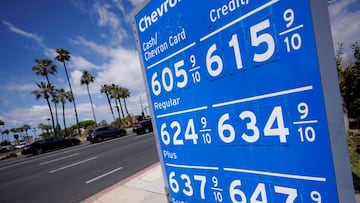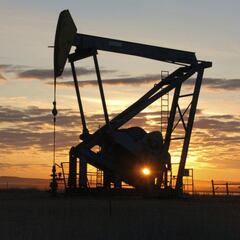Will oil companies to increase production as invasion of Ukraine limits global supply?
President Biden has announced that he will release one million barrels of oil each day for the next six months and called on oil companies to boost production.


Just as the International Panel on Climate Change released the preliminary findings of its most alarming report on the state of climate science, the Russian invasion of Ukraine has thrown global energy markets into a tail spin. The world's dependence on fossil fuels has never been so viable to leaders and the public.Gas and energy prices are surging, and while, short-term solutions are being tapped, none send a positive sign of rapid de-carbonation happening any time soon. With out such a change, the report paints a grim picture.
Energy resource markets stabilize at high price
While gas prices have fallen by around eight cents over the last week, prices are still over a $1.30 higher than this time last year. The Russian invasion of Ukraine has placed further strain global oil supply, after disruptions from the pandemic and the corporate response had already sent energy prices soaring. Corporate profits broke records in 2021, with Accountable US reporting that the four "US oil and gas giants Shell, Chevron, BP, and Exxon" celebrated a "'momentous year'” with some of the highest profits companies have seen in nearly a decade," driven in part by high oil prices. Alone these companies "$24.4 billion in quarter four of 2021, bringing their total profits for last year to over $75.5 billion." These upwards trends are expected to continue this year, as consumers struggle to balance the quickly rising costs.
Biden dips into strategic reserves to bring down gas prices
On Thursday 31 March, President Biden announced that he would sign an order that releases one million barrels of oil from strategic reserves for the next six months in an attempt to stabilize the price of gasoline for consumers. During the speech, the president also called on the oil industry to put the needs of their customers over their corporate profits.
"Look, I’m a capitalist. I have no problem with corporations turning a good profit. But companies have an obligation that goes beyond just their shareholders: to their customers, their communities, and their country," said President Biden.
Biden's calls on industry did not end there, he also sent a warning to companies "sitting" on unused drilling permits, of which he said the industry holds around 9,000. To encourage oil production on the more than twelve million aches of unused land, the president called on Congress to enact a "use it or lose it policy."
"Congress should make companies pay fees on wells on federal leases they haven’t used in years and acres of public land they’re hoarding without production" said the president while describing the policy.
Lease rent and royalties
Unsurprisingly, the largest lobbying organization for oil companies, the American Petroleum Institute (API) has pushed back arguing that the administration does not understand the leasing process.
Rental fees
The organization's CEO Mike Sommers said recently that activity on leases has reached on public lands had reached historic high, a fact not supported by federal government oversight information. This supposed record permit use comes as more than 5,000 permits are "awaiting approval from the administration and thousands more tied up in litigation."
Continuing to accuse the Biden administration of not having their facts right, Sommers noted that companies continue to pay rent on public lands even if they go unused. However, the prices paid by these multi-billion dollar companies should not be overstated.
The Bureau of Land Management (BLM) charges "rent is at a rate of $1.50 per acre for the first five years and $2.00 per acre for years six to ten." Even if all acres had been leased for more than five years, the total rent possible to be paid to the BLM in 2021 would have been around $50 million; accounting for less than one percent of the sectors profits in the same year.
Royalties
A report published by the BLM last November concluded that Congress should vote to increase royalties charged on oil and gas production. The current rates have not been increased for more than one hundred years (i.e. when they were first implemented).
The royalties are used by the agency to provide oversight and carry out other mandates and functions. At the federal level a royalty of 12.5 percent is applied to oil and gas resources.
The API has stated that exploration on a permitted area cannot be done before the lease is bid on. This is false. A application for exploration on public lands can be submitted to the BLM to review. If approved, then a findings report must be submitted before a possible sale can begin.
After an exploration, or perhaps without one, a company can anonymously nominate a parcel for leasing. There are two process the BLM uses to issue permits: competitive and non-competitive.
The competitive bidding process requires that a company pay "minimum bonus bid set at $2.00 per acre, and the successful bidder is required to pay the first year’s rent at $1.50 per acre and administrative fees."
Should no bids be made through the competitive process, US law allows for the permit to be "sold non-competitively for up to two years with just the first year’s rent, the administrative fee and no bonus bid." During a Senate hearing in April 2021, leadership of the BLM told leaders that of the more than 37,000 oil and gas permits on public lands awarded around 15,000 were granted through the non-competitive process, saving companies millions of dollars.
Will companies increase production?
Related stories
The API has said that its members are not equipped to increase production and recommended that the administration allow for more permits to be issued. None the less, the administration's stance on not increasing the number of permits on public lands relates to another finding of the BLM's report. Specifically, that while the oil and gas industry argue "that the significant surplus of leases and permits is necessary for a successful business model, this leads to a "speculative approach [and] contributes to unbalanced land management." Rather the BLM being able to use its budget for conservation or recreation, the land sits idly unused and vulnerable.
It does not seem that the industry is willing to increase production without some assurances that they will see some longer-term benefits, like more permits.

